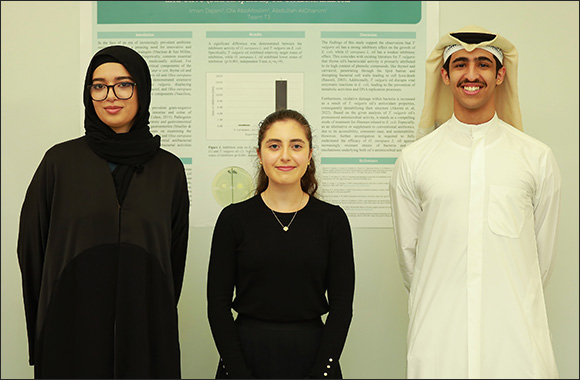
Doha - March 6, 2024: First-year pre-medical students gained valuable experience of research when they rounded off the work of two semesters by presenting their findings at an open poster session. A total of 56 students, working in groups of two and three, executed independent research projects from beginning to end, from carrying out a literature review and formulating a question and a hypothesis, to conducting experiments in the laboratory, gathering and analyzing the data, writing up the results and finally presenting their findings to fellow students and WCM-Q faculty. The projects investigated the antimicrobial effects of a variety of herbs, spices and other natural products traditionally used to prevent or treat infections. To do this, the students cultivated several different species of bacteria in nutrient agar in petri dishes and then introduced the natural remedy, observing how far each was able to inhibit the bacteria’s growth. This year the students presented a total of 19 posters investigating the anti-microbial effects of the following natural remedies: Nigella sativa oil, lemon juice, thyme oil, olive oil, cajuput oil, fennel oil, neem oil, the traditional Sudanese fermented drink abreh, cardamom, cinnamon, turmeric, ivy extract, saffron, clove oil, shilajit (a mineral found in the Himalayan region), sumac, wax apple peel extract, onion, rose extract, Japanese matcha, black tea, and propolis oil, a resin-like material made by bees from the buds of cone-bearing trees. The students worked on their projects in biology classes over the course of 16 weeks during the fall and spring semesters. Dr. Kuei-Chiu Chen, professor of biology, said: “This course presents the first opportunity for students on the Six-Year Medical Program to come up with a research question and then design an experiment to test their hypothesis. They showed a very good understanding of the process and brought many new and unique ideas to their projects, and they did a great job of interpreting their data, presenting their work, and speaking confidently about their findings. The beauty of this course is that it gives the students a keen understanding of how a research project is conducted from beginning to end, which is a key part of their development as physician-scientists.” Students Muhammad Abdullah Chattha, Mustafa Ahmad Ghuman and Abdulla Fakhroo presented a poster about their research investigating the anti-bacterial properties of oil extracts of neem trees and fennel seeds, both of which are commonly used in traditional medicine approaches. Muhammad Chattha said: “Through our experiments we found out that the antimicrobial effect of neem oil and fennel oil are far stronger when they are used in combination than when they are used separately. We really enjoyed the course because we were not only able to experience for ourselves exactly how a research project is conducted but we also had the chance to contribute something new to the literature.” WCM-Q notes that these results concern effectiveness in vitro, and do not constitute evidence of therapeutical effectiveness. As such, the results discussed here should not be considered a medical recommendation in any way.
|